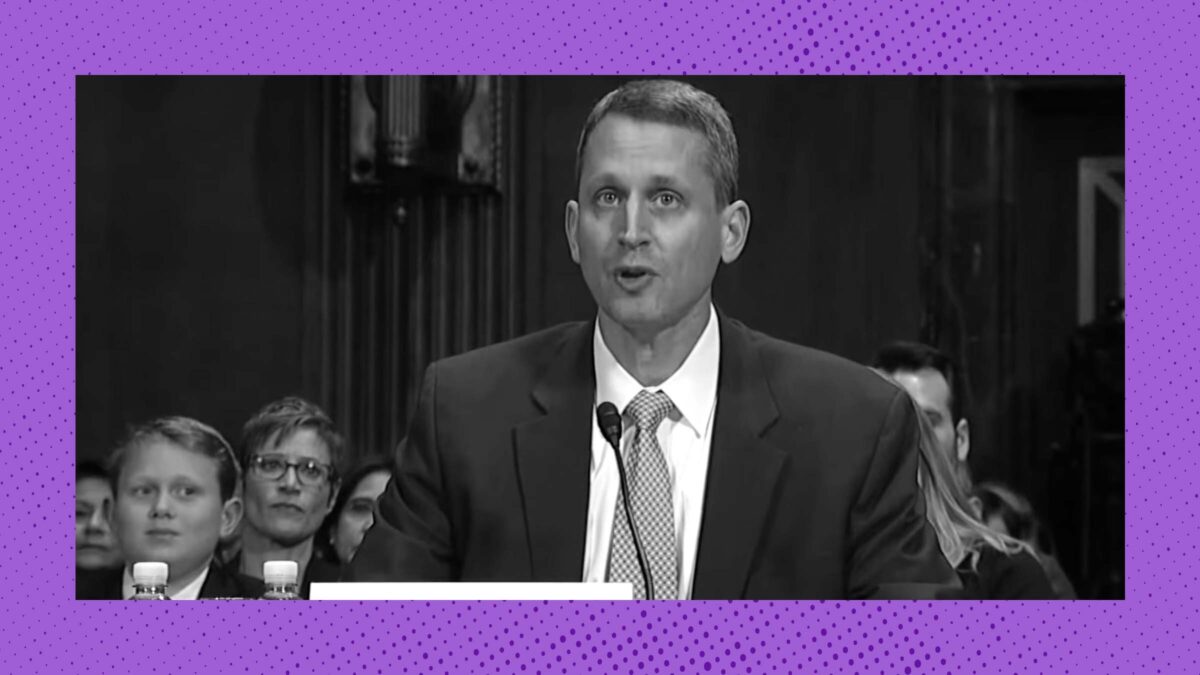This post, God willing, will be the very last time you read about federal appeals court judge Kyle Duncan’s debacle at Stanford on Balls & Strikes. As a matter of editorial policy, we place strict limits on the number of stories we publish about Homophobic Tim Robinson yelling at law students half his age, as part of our commitment to not make the Internet a more poisonous place than it already is.
That said: To date, much of the coverage of this event, particularly from Duncan’s cheerleaders in conservative media, has focused on just how severely the Very Loud And Rude students should be punished for having the temerity to ask questions that Duncan seemed physically incapable of answering without raising his voice. (This narrative is largely the consequence of the fact that the usual suspects in conservative media broke this story with carefully-clipped footage of Duncan’s appearance that conspicuously omitted nearly all of his actual remarks.) But I also want to highlight that on one of the few occasions that he did engage with students, Duncan was as incoherent on substance as he was embarrassing on process.
Some context is relevant here. During the question-and-answer portion of the event, a student stood up and asked how women who are denied access to reproductive health care can be full participants in society, particularly given the high levels of sexual violence that can lead to unintended pregnancies. In response, Duncan mocked her for making “a long speech” that failed to understand the role of courts in democracy. “The people who address large-scale questions like that are the legislatures,” he said. “Evidently, some of you are being taught in law school that it’s all up to the super-wise Solomonic judges to just sort of make decisions. I don’t ascribe to that particular view of the judiciary.”
This answer, such as it was, prompted another woman to follow up. “Do you think that considering the ethical implications of your decisions is outside the scope of your work?” she asked. When Duncan pretended not to understand and started riffing about judicial ethics, she tried again, asking whether he considers “fairness” when writing his opinions.
Again, Duncan’s answer makes clear that he is contemptuous of the very idea. “You mean, do I sit back and sort of say, ‘Well, what is fair? What is fair? What do I think is fair?’” he said. “The answer is, judges aren’t supposed to engage in some sort of cosmic fairness balancing, because we have elected officials to do such things!”
Again, listen to this man Kyle Duncan legit shout at the woman who asked him a question, pretend not to understand it, and then deliver a mock-rant about how judges don’t consider “fairness” as part of their work, and tell me he’s the persecuted victim here lmao pic.twitter.com/2iFLn2DcHc
— Jay Willis (@jaywillis) March 12, 2023
This assessment, of course, might come as news to Duncan’s fellow Republicans on the U.S. Supreme Court, who spent most of oral argument in the student debt forgiveness cases last month pondering whether President Joe Biden’s plan is, to use a technical term, Too Unfair To Be Legal. Justice Neil Gorsuch wrung his hands about the plan’s “costs to other persons in terms of fairness”; at least three times, Justice Samuel Alito demanded that the government explain, to his subjective satisfaction, why the plan is “fair.” Chief Justice John Roberts, a vocal skeptic of fairness when it doesn’t suit his interests, asked Solicitor General Elizabeth Prelogar why fairness “isn’t…a factor that should enter into our consideration,” which is the way you phrase a question when you’ve already decided on the answer.
Obviously, the Chief Justice is not Duncan, and Duncan, despite his fondest wishes, is not the Chief Justice. But both men are superstars of a conservative legal movement that purports to imagine judges as neutral, apolitical umpires—not, as Duncan put it, “super-wise Solomonic judges” who “just sort of make decisions.” For generations, every serious Republican politician has memorized the talking points about how judges are civil servants tasked with applying the law, not making it, no matter what “cosmic fairness” (or unfairness) may result.
For anyone who understands the power of recasting their policy preferences as objective legal truths, this framework is extremely useful. As Duncan’s and Roberts’s comments reveal, it also does not stand up to even cursory scrutiny. As I wrote earlier this month, when conservative judges are sympathetic to the people before them—say, to those opposing Biden’s student debt plan—they bend over backwards to find reasons to take appeals to fairness seriously. When they aren’t—say, when forced to answer for their record of anti-choice judicial activism—they wave their arms, splutter a little, and hope someone else asks an easier question.

